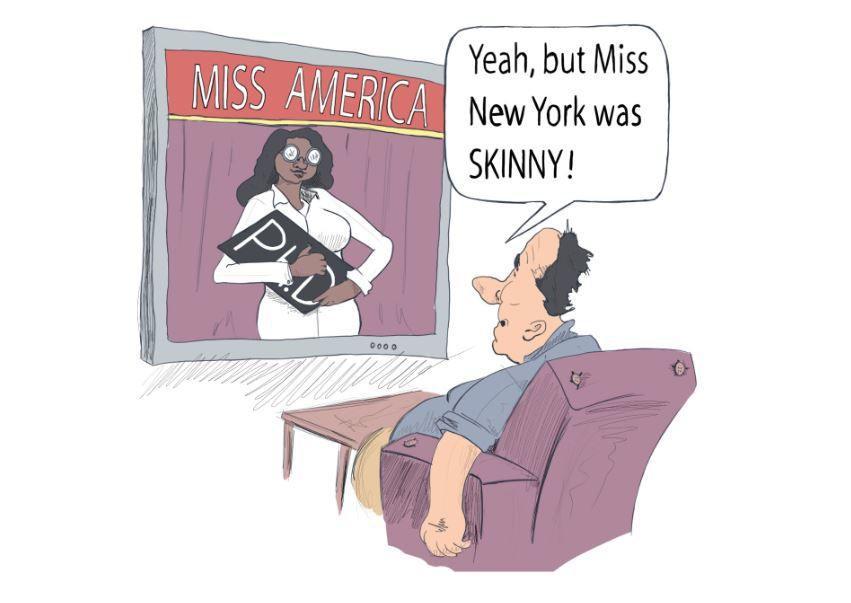Feminists in American history have used intellect, perseverance and encouragement from other women to demand gender equality. The physique of a woman was never considered an important tool needed to craft a platform to voice our rights and worth. Unfortunately, pageants are sneaking this tool in our hard-earned toolbox and are creating a distorted image of womanhood.
Executives who run these commercial beauty contests assure the public that they embrace female empowerment when, in reality, women are pit against each other to win a competition solely based on looks. It’s time for the sashes, crowns and trophies to be laid to rest, and the Vaseline to be wiped off teeth because our charisma is skin deep. Our imperfections shouldn’t be stifled to win a title.
America is home to numerous pageants, but Miss America and Miss USA are top-tier. However, both contests possess different characteristics despite their similar nature of attracting hopeful girls who spend hours training for the “glamorous” event and are willing to pay a lot of money to win the competition.
Miss America originated in 1921 and was created to attract tourists to the boardwalks of Atlantic City, New Jersey. Unlike Miss USA, the pageant has a talent contest and the winner is awarded an academic scholarship of $50,000. In 2018, chairwoman of Miss America, Gretchen Carlson, took initiative and canceled the swimsuit portion of the competition to emphasize inclusivity of all sizes. Carlson also decided to change the evening gown competition, which now allows women to wear whatever they want. Furthermore, the event is now centered heavily on interviewing, as women are required to give their opinion and proposed solution to societal issues.
Carlson’s changes were made to minimize the allure of women’s physicality over brains, but it’s not enough. Women are still competing against one another to be granted public validation in society. The habitual use of makeup in the contests continues to hide the natural beauty of blemishes, scars, freckles and acne. Spray tans are still a popular product used among women, often to hide natural stretch marks and to achieve that socially desired bronze color.
Contestants continue to feel pressure to meet society’s outdated beauty standard, even though the competition advocates for female empowerment. Young girls are convinced they will build their platform when they become eligible to enter the contest, completely oblivious to the platform women already have. We need to empower one another and remind ourselves commercial contests don’t determine our worth in society — we do. Female activists can inspire one another to transform their passion for change into impactful actions without participating in a pageant.
Despite the risk attached to protest, past women activists managed to find their inner lioness and roar. Beauty contests don’t allow contestants to express their values wholeheartedly, as women stand center-stage and give ambiguous answers to controversial questions in fear of infuriating the public. This defeats the purpose of female empowerment entirely by not motivating contestants to be confident in their truth. Further, it disillusions the new reputation pageants like Miss America strive to have.
Some contestants feel pressured to give near-perfect answers and become nervous, which causes them to respond inadequately. These women are often mocked and bullied on social media, perpetuating a cycle of female degradation. Instead of getting an everyday citizen from the contestant’s state to ask a personal question on an issue in their community, the organization creates difficult questions the contestant doesn’t have sufficient answers to. The questions are often asked by celebrity judges, emphasizing the fabricated nature of pageants.
The Miss USA pageant was created after Miss America winner, Yolande Betbeze, refused to pose in a swimsuit made by Catalina Swimsuits, the pageant’s sponsor, for a newspaper in 1951. The company was upset and decided to form their own pageant. The for-profit contest focuses on female confidence and is known for its infamous swimsuit competition. The pageant awards its winner a year-long salary, skin and hair care services, a rent-free New York apartment until a new woman is crowned, clothes, representation from the talent agency WME-IMG and gifts from sponsors. The winner then goes on to compete in Miss Universe, an international beauty contest run by Miss USA and formerly owned by business-mogul-turned-politician President Donald Trump.
Miss USA is dangerous because it epitomizes the myth women are only good for their bodies. Likewise, Miss Universe is toxic because it glorifies female competition internationally and implies women must have a specific look and personality to be successful.
Women can hone their leadership skills by volunteering in their community for free. It’s vital we influence young girls not to board the “Toddlers and Tiara” train. Competition should never be the foundation of sisterhood. Confidence fluctuates, but women must be consistent in demanding the equality they deserve.
Jasmine Edmonson is a 20-year-old mass communication sophomore from Denham Springs, Louisiana.
Opinion: Miss America, Miss USA still value beauty over brains
September 18, 2018





